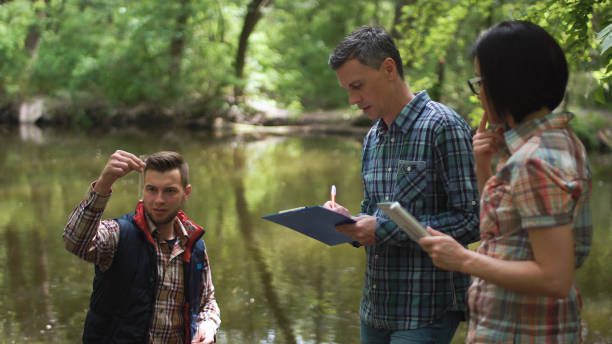
| Ecologist Key Stats | |
|---|---|
| Avg. Salary / year | $66,900 |
| Avg. Pay / hour | $32.16 |
| Education | 4+ Years |
| Job Outlook | 11% |
If you’re interested in science and the environment, and have strong academic skills, then you might like to become an ecologist.
The living things in the world around us are all closely related.
An ecologist studies the relationships in ecosystems and nature and applies this knowledge to a range of applications.
An ecologist is a biological scientist whose specialization is in ecology.
Most have high academic qualifications, at least at a master’s level, many have doctorates.
There is quite a lot of variation in the work of an ecologist and they are employed within both the public and private sectors.
Your work as an ecologist could range from studying tiny single-celled organisms, to giant redwood trees, to entire ecosystems.
Table of Contents
Education Requirements to Become an Ecologist
If you’re in high school and would like to become an ecologist, a good way to prepare is to take subjects in biology, chemistry, and mathematics.
If there is a local environmental group in your area, joining this group would be a good way to start getting experience.
At college, you’ll need to enroll in a four year bachelor’s degree with a major in ecology, environmental science, climatology, or a similar field.
You will also need to write and publish reports in your career, so taking subjects in writing can help.
Math is another handy subject.
You’ll also need strong computer literacy to work with the various scientific computer programs that ecologists use.
To become an ecologist, you will need at least a master’s degree.
If you get very strong results in your undergraduate degree, you may be able to earn a place in a doctorate program right away.
Alternatively, you could also enter a master’s program, with a focus on the area of ecology you want to work in, then go on to a doctorate after that or simply start working with a master’s degree.
For some excellent information on a career in ecology, you might like to take a look at the Ecological Society of America website.
Ecologist Job Description
Working as an ecologist, you could find yourself completing a wide range of duties.
For instance, you could spend your day in the outdoors completing field research.
You could just as likely be at a computer putting together a research report.
Many ecologists also work as teachers, and take classes at colleges.
In an academic setting, an ecologist would take classes and mark reports for most of the year.
In the summer, they would head out to the field to conduct research.
They would also spend a good amount of time writing and publishing their own reports.
Many ecologists work in the public sector.
Here they may study aspects of the environment such as soil, air, and water quality.
They could study endangered species and use their findings to help protect them.
Like in colleges, they would be expected to prepare written reports of their findings.
In the private sector, an ecologist could be working on product development.
They may work the improve techniques in agriculture, or similar industries which work within the environment.
Ecologist Salary and Career Path
There are many different areas you can work in when you become an ecologist.
Many work on the field, completing grass roots research.
Some are employed by colleges, where they teach and conduct their own research.
Some ecologists work within parks and museums, for instance in national parks, where they protect wildlife and also provide education to the community.
Other ecologists may work within the private sector, or for non-profit organizations.
As your skills improve, there is room for advancement.
You can expect to have greater participation in research, and eventually head your own projects.
Some ecologists go to climb the ranks of academia, others go on to executive roles in business and product development.
The median salary of an ecologist is $84,000 a year.
This industry is expected to grow faster than average with the green movement becoming more visible in our society.
Job prospects are good, especially for those that have a doctorate in ecology.
Here are some similar careers to ecology that you might be interested in reading about:
If you’re interested in science and looking for a research-based career, then you might like to become an ecologist.
Job prospects are strong, and the salary available for successful people is good.
Ecology also offers an opportunity to contribute to the preservation of the environment ad to give back to the community.
![]() The below information is based on the 2021 BLS national averages.
The below information is based on the 2021 BLS national averages.
National Average Salary
$81,240Average Salary by State
| State | Avg. Annual Salary |
|---|---|
| Alabama | $66,900 |
| Alaska | $86,210 |
| Arizona | $66,390 |
| Arkansas | $68,320 |
| California | $94,350 |
| Colorado | $88,990 |
| Connecticut | $84,920 |
| Delaware | $57,630 |
| District of Columbia | $123,900 |
| Florida | $61,940 |
| Georgia | $71,680 |
| Hawaii | $74,810 |
| Idaho | $73,490 |
| Illinois | $91,010 |
| Indiana | $64,150 |
| Iowa | $70,910 |
| Kansas | $70,760 |
| Kentucky | $58,870 |
| Louisiana | $78,900 |
| Maine | $66,500 |
| Maryland | $81,030 |
| Massachusetts | $95,770 |
| Michigan | $79,950 |
| Minnesota | $82,360 |
| Mississippi | $53,330 |
| Missouri | $70,310 |
| Montana | $69,450 |
| Nebraska | $65,640 |
| Nevada | $70,650 |
| New Hampshire | $81,820 |
| New Jersey | $96,060 |
| New Mexico | $79,620 |
| New York | $90,010 |
| North Carolina | $71,030 |
| North Dakota | $63,110 |
| Ohio | $75,660 |
| Oklahoma | $68,600 |
| Oregon | $82,890 |
| Pennsylvania | $74,740 |
| Rhode Island | $83,130 |
| South Carolina | $66,800 |
| South Dakota | $62,910 |
| Tennessee | $68,660 |
| Texas | $78,430 |
| Utah | $71,120 |
| Vermont | $72,300 |
| Virginia | $84,350 |
| Washington | $86,510 |
| West Virginia | $69,980 |
| Wisconsin | $74,710 |
| Wyoming | $69,610 |
| Puerto Rico | $40,890 |
| Virgin Islands | $59,970 |
The top earning state in the field is District of Columbia, where the average salary is $123,900.
These are the top 5 earning states in the field:
* Employment conditions in your area may vary.
Frequently Asked Questions
What does an ecologist do?
An ecologist is a specialist that focuses on the relationship of living organisms with their environment.
There are a lot of different types of ecologists and, of course, the duties and responsibilities will vary a lot, depending on the sub-discipline that you decide to choose.
For example, some ecologists might be specializing in ecological restoration and restoring unhealthy systems; aquatic ecologists, in their turn, study the relationship of living organisms in various aquatic environments; community ecologists focus on how different species interact with each other, and so on.
Some of the major duties of an ecologist might include collecting data; writing technical reports; maintaining and calibrating instrumentation; conducting field research; examining ecological processes and mechanism responses, etc.
How much do ecologists make?
On average, an ecologist can make a little less than $51.000 per year in the United States.
In case you decide to follow this career path, you can expect to earn anywhere between $36.000 and $78.000 annually.
The salary would certainly depend on a variety of factors – your education and experience level, the employer, the location and so on.
The ecologists that work in California, Colorado, and Georgia, for example, have the highest average salaries.
An entry-level ecologist can earn $12 per hour, while a specialist with plenty of experience will make $32 and more.
How much does it cost to become an ecologist?
You would certainly need a bachelor’s degree in biology, environmental science, zoology, ecology or a related field, in order to become an ecologist.
A year in a university can cost you anywhere between $8.000 and $45.000 (and more); the cost depends on a variety of factors (the books, supplies, and accommodation expenses are not included).
In case you want to do in-depth research or serve as a consultant, you should consider going for a master’s degree (over $11.000).
Aspiring ecologists that are willing to teach at a university would need to hold a doctorate degree, in most cases (around $20.000 per year).
What is the demand for ecologists?
Between 2016 and 2026, the ecologist job market is expected to grow by 11%, according to the Bureau of Labor Statistics.
That is faster than the national average for all occupations in the United States.
The public will become more interested in eliminating the hazards facing the environment and the living organisms of our planet in the near future.
How long does it take to become an ecologist?
It will take you 4 years to obtain a bachelor’s degree and another 2 years to earn a master’s degree.
A doctorate degree typically takes 5-6 years to acquire.
Make sure to choose the area of ecology that you want to focus on beforehand.
Volunteering at wildlife conservations and other organizations can be helpful, but is not necessary.













